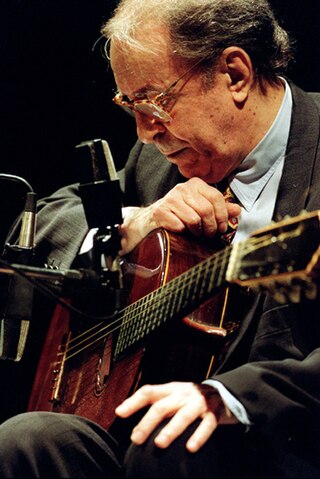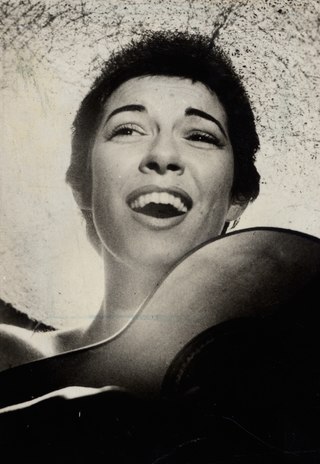Related Research Articles

João Gilberto was a Brazilian guitarist, singer, and composer who was a pioneer of the musical genre of bossa nova in the late 1950s. Around the world, he was often called the "father of bossa nova"; in his native Brazil, he was referred to as "O Mito" . In 1965, the album Getz/Gilberto was the first jazz record to win the Grammy Award for Album of the Year. It also won Best Jazz Instrumental Album – Individual or Group and Best Engineered Album, Non-Classical. Nominated at the Grammy 1978 in the category Best Jazz Vocal Performance, album Amoroso, and winner category in Grammy 2001 with João voz e violão Best World Music Album.

Joyce Moreno, commonly known as Joyce, is a Brazilian singer-songwriter and guitarist.

Luiz Gonzaga do Nascimento, Jr., better known as Gonzaguinha, in Portuguese Little Gonzaga, was a noted Brazilian singer and composer.

Elza da Conceição Soares, known professionally as Elza Soares, was a Brazilian samba singer. In 1999, she was named Singer of the Millennium along with Tina Turner by BBC Radio.

Ignez Magdalena Aranha de Lima Barroso was a Brazilian sertanejo singer, guitarist, actress, TV presenter, librarian, folklorist and teacher.

Fafá de Belém, born Maria de Fátima Palha de Figueiredo in Belém do Pará on August 9, 1956, is a Brazilian singer considered one of the great female singers of MPB. She took her stage name from the city of her birth and in addition to a successful recording career that spans over three decades, it is fair to say that she has been one of the great sex symbols of Brazilian pop music. Her husky mezzo-soprano voice is known for its extensive emotional range, from tender ballads, to sensual love songs, to Portuguese fados all the way to energetic sambas and lambadas.

Herbert Lemos de Sousa Vianna is a Brazilian singer, songwriter, guitarist and record producer mainly known for his work with Brazilian pop rock band Os Paralamas do Sucesso.
Gilberto Mendes was a 20th-century Brazilian avant-garde composer, and one of the pioneering fathers of the company New Consonant Music.

Pro-Música Brasil (PMB), previously Associação Brasileira dos Produtores de Discos (ABPD), is an official representative body of the record labels in the Brazilian phonographic market.

Exaltasamba is a Brazilian pagode music group, formed in 1982 in São Bernardo do Campo, São Paulo. The group began simply playing gigs in restaurants and bars. They later began writing their own songs, eventually releasing an album, "Eterno Amanhecer" in 1992. However, it wasn't until 1996 that they truly became successful, with their 1996 and 1997 albums, "Luz do Desejo and "Desliga e Vem" each going Double Platinum. They released a Live Album with songs handpicked by their fans via E-Mail. In 2003, one of their best known Vocalists, Thiaguinho, joined the group. They continued to release albums. Their 25th Anniversary was in 2010, and they had written new material to perform on this show. The year thereafter, Thiaguinho announced that he planned on leaving the group. They subsequently announced their disbandment after 25 years as a band. Their final concert was in February 2012, and it was broadcast on a channel considered the Brazilian Equivalent to the United States' MTV; Multishow. Or so we thought.

Belchior was a Brazilian singer and composer. He was one of the first MPB singers from the Brazilian northeast to reach mainstream success, in the early 1970s.

Thaeme Mariôto is a Brazilian pop singer and songwriter. She rose to fame after winning the second season of the reality television show Ídolos Brazil. After Idolos, she enjoyed a solo career, prior to joining the sertanejo duo Thaeme & Thiago alongside Thiago.
Sempre Livre was a Brazilian pop rock band formed in Rio de Janeiro, only by women. The name of the group mentioned a famous brand of a sanitary pad. In 1984, they recorded their first disk, produced by Ruban, the same of the group As Frenéticas. The greatest hit was the song Eu sou free, composed by Ruban and Patrícia Travassos. The band was over in 1986, but returned five years later with the disk Vícios da Cidade, but only the percussionist stayed from the original formation
Dalto Roberto Medeiros, stage name Dalto is a Brazilian composer and singer.

Quarteto Novo was a group formed in São Paulo, Brazil in 1966 which released one landmark instrumental album and launched the careers of some of the band's members. The eponymous 1967 album has been influential in jazz and pop music.

Flávio Hugo Venturini is a Brazilian singer and songwriter.

Agnaldo Timóteo Pereira was a Brazilian singer and politician.

Carmelita Madriaga, known as Carmen Costa, was a Brazilian singer and composer.

Antônio Carlos Moreira Pires, better known as Moraes Moreira, was a Brazilian musician and songwriter. During the 1970s he played guitar and sang in the band Novos Baianos, after which he embarked on a solo career recording 29 albums. Moreira was involved in recording 40 full-length albums with Novos Baianos and Trio Elétrico Dodô e Osmar, and two more albums with guitarist Pepeu Gomes. Moreira was one of the most versatile composers of Brazil, mixing the genres of rock, samba, choro, frevo, baião, and classical.

Alaíde Costa Silveira Mondin Gomide, known as Alaíde Costa, is a Brazilian singer-songwriter.
References
- ↑ "De Ira! a Run the Jewels, ouça alguns álbuns recém-lançados que merecem a sua atenção". Vagalume (in Brazilian Portuguese). Retrieved 2021-04-23.
- ↑ "Dulce Quental". Dicionário Cravo Albin da Música Brasileira. Retrieved 20 March 2012.
- ↑ "Dulce Quentalpublisher=Cantoras do Brasil" . Retrieved 20 March 2012.
- ↑ "Dulce Quental". 27 November 2009. Archived from the original on 4 March 2016. Retrieved 21 March 2012.
- ↑ "Discografia". Dulce Quental. Archived from the original on 15 January 2013. Retrieved 20 March 2012.